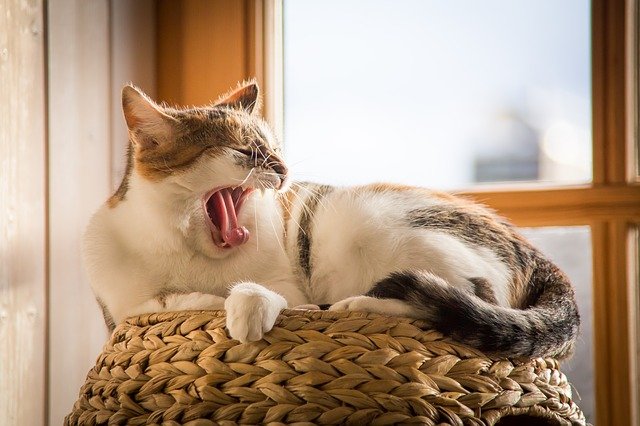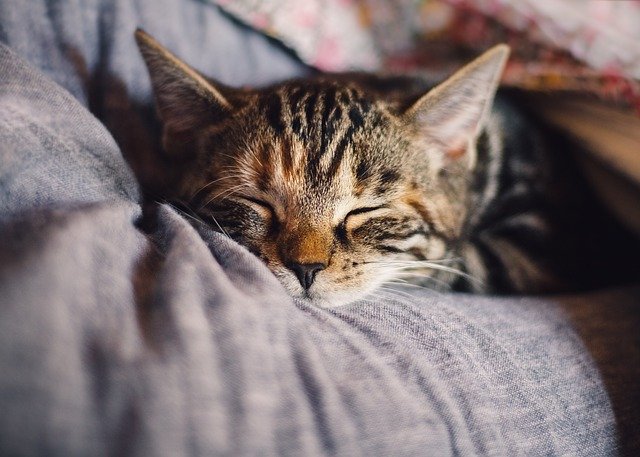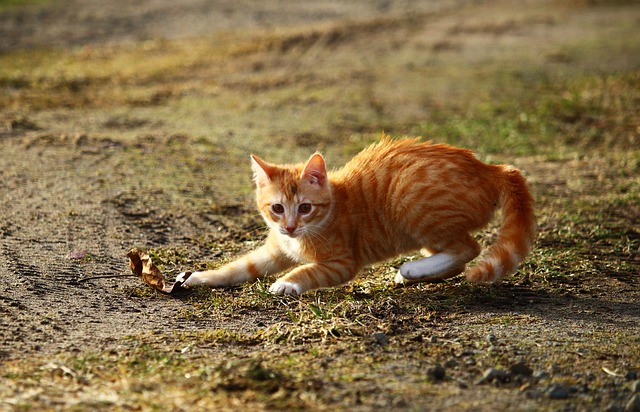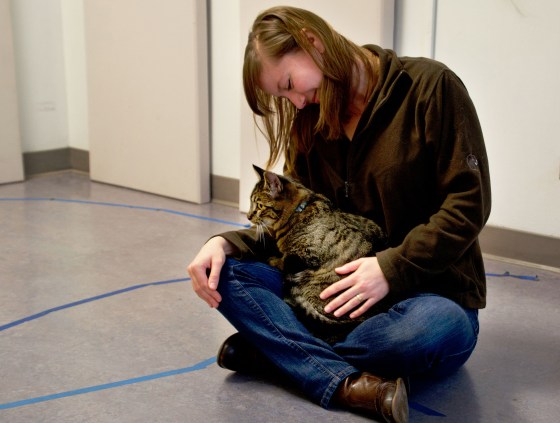You are busy humming away or singing your favorite song as you do your load of laundry.
From nowhere, your kitty appears and wants to be petted or just sit by your side.
At first, you ignore the behavior thinking it’s a one-off thing.
However, when it happens over and over again, you are forced to stop and think about it. Does the cat love your voice?
Perhaps your voice reminds her of something that happened in the past?
What if she hates your voice?
We sought answers to these questions and came up with a list of 6 reasons why cats come to you when you sing.
1. The Cat Hates The Tune

Humans love music for one reason or the other. We listen and belt out tunes to distress, relax, remind ourselves of past happenings, lift our mood, make chores fun, you name it.
Because of this, it is easy to think that your furball views music the same way. That they somehow like the kind of music you like.
However, nothing could be farther from the truth. Researchers sought to find out if cats do enjoy music and if they relate to what we listen to.
In a study published in the Journal of Applied Animal Behavior Science, researchers exposed cats to human-friendly music and another category of songs calibrated for kitties. The cats responded to the second and totally ignored the first.
What this means is that felines do like music but it has to be tailored to them.
The tune has to fit into the way cats communicate, specifically their frequency range and tempo.
All this is to say that, your cat may be running towards you in a bid to scream “Please stop! I can’t take it!”
If you are screaming at the top of your voice, your kitty is less likely impressed by the tune as it is too loud for her liking.
2. Super-Sensitive Hearing
Speaking of loud music, cats are super-hearers.
According to Wikipedia, felines and humans share a similar range of hearing.
What distinguishes the two species is that kitties can hear high-pitched sounds much better than we can.
They can hear as much as 64 kHz which is an octave above a dog and 1.6 octaves above humans.
When you hum, whistle, or sing a tune, your kitty hears it as one of the loudest things ever.
If you know a thing or two about cats, you will confirm that they don’t particularly enjoy loud noises.
That’s why when you yell at something, put on the vacuum cleaner, or watch horror movies at top volume, your fur baby will bolt up and leave the room for a quieter area.
Perhaps your singing has the same effect on her. In this case, try singing in a low-pitched voice and see what happens.
3. The Song Is Calming

While cats don’t like human music (especially the loud, fast type), some songs are feline-appropriate.
If you sing and your kitty runs in your direction, chances are your tune has the tone, pitch, and tempo she likes.
In most cases, these are mellow, low-pitched songs that almost create a calming effect in your kitty.
If she purrs and gives you head butts and shows no signs of leaving, you nailed it.
A team of researchers from the Louisiana State University discovered that cat-friendly music can help nerves when cats are having a hard time visiting the pet.
During the study, cats responded to classical music compared to heavy metal.
This was before the aforementioned study showing the power of cat-specific music.
The results showed lowered cat stress scores for kitties who listened to cat music compared to those who listened to nothing at all.
When you sing at home, your cat perhaps finds your voice so calming and will head your way to listen to it more.
4. Nostalgia
If you used to sing to your kitty when she was a kitten, she will respond when you do the same in her adult years.
Take a look at this incredible story from Marianne Kane, a lady who adopted a kitten (Sunny) only to realize that she would still recognize when her foster mom sang to her at 2 ½ years old.
Sunny would jump over and hang on Marianne’s arm every time she sang.
The cat owner believes that her pet does that because she would sing to her a lot as a kitten.
Dr. Michael W. Fox, an animal doctor had this to say about the whole thing:
“Cats are vocal beings and have a certain collection of sounds that you can mimic by accident as you sing.”
5. Curiosity
The adage ‘curiosity killed the cat’ is true with regards to raising a kitty.
If you’ve raised one, you know she always wants to know what is going on in her environment at all times.
Being a hunter, she has to be aware of her surroundings. It’s a survival instinct!
At home, that means analyzing all sounds to know what they mean. Your singing perhaps arouses the curiosity in her.
Naturally, she will approach you to find out what’s going on. Perhaps she simply doesn’t understand what’s going on with you.
She might be wondering if you are okay or something.
Related Post: 5 Sounds That Make Cats Come To You
6. Time to play

The last probable reason your kitty comes to you when you sing is perhaps because she thinks it is in an invitation to play.
This article by PetMD claims that felines communicate with each other through vocalizations among other things.
When you chant or pipe out a song, your cat may interpret that you are asking her to play.
If she is in the mood for it, she will approach as a way of saying yes to the invite.
Parting Thoughts
Confused as to why your kitty comes to you when you sing?
It could be one of the aforementioned reasons.
If she hates the song, she will display other symptoms of displeasure such as leaving the room after approaching.
In such a case, you might want to stop singing and see what happens next.
Else, keep on singing and watch the reaction of your kitty some more.
Here are other posts that can farther help you understand your kitty’s behavior:
Why Does My Cat Come to Me When I Cry?
Why Does My Cat Chatter At Me?
Why Are Cats Afraid of Brooms?
Why Is My Cat More Affectionate When I’m On My Periods?
Why does my Cat watch me Poop?
Why Does My Cat Chew on Corners?
Why Does My Cat Lick My Dog’s Ears?

Hi! I am Eleanor Price. I started this website after my cat, Louie, almost died from a case of botulism (a type of food poisoning often caused by bacteria that grow on food items). Turned out that my cat’s diet was the problem. I have made it my duty to provide the best information and recommendations about everything cat lovers need to know about their felines’ health and wellbeing. My goal is to find the most informative content on anything feline-related and share it with fellow hardworking kitty lovers.

